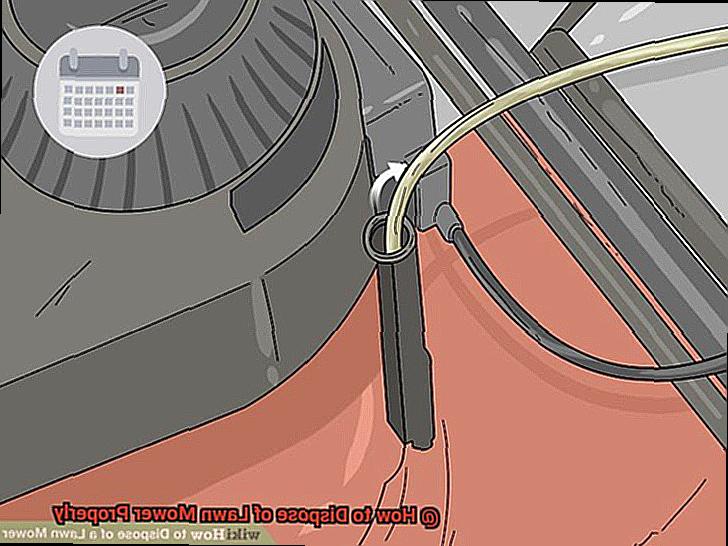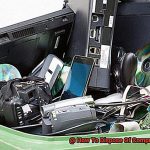Do you feel like your trusty lawn mower has seen better days? Is it time to bid farewell to your faithful machine and dispose of it properly? Fear not, as disposing of a lawn mower is easier than you might think. Not only is it the environmentally responsible thing to do, but it can also free up some much-needed space in your garage.
In this blog post, we’ll provide you with some valuable tips and tricks on how to dispose of your lawn mower safely and efficiently. From recycling options to donating possibilities, we’ve got all the information you need. We’ll also share some useful advice on how to prepare your lawnmower for its final journey.
So, if you’re ready to say goodbye to your old lawnmower and do it right, then keep reading. You’ll discover everything there is to know about how to dispose of your lawn mower properly while making a positive impact on our planet. It’s time to take that next step towards a cleaner environment and reclaim that valuable garage space.
Recycling Lawn Mowers
Contents
- 1 Recycling Lawn Mowers
- 2 Donating Lawn Mowers to Charities or Non-Profit Organizations
- 3 Disposing of Hazardous Waste from Lawn Mowers
- 4 How to Find Your Local Recycling Center
- 5 What to Look for When Donating a Lawn Mower
- 6 Tips for Safely Handling and Disposing of Hazardous Material
- 7 How to Properly Package and Label Hazardous Materials
- 8 What to Do if You Cannot Find a Suitable Recycling or Donation Option
- 9 Conclusion
Recycling is the way to go. Not only does recycling ensure that the materials used in your lawn mower are repurposed, but it also helps prevent pollution and promotes sustainability.
The best way to recycle your lawn mower depends on where you live. One option is to check with your local recycling center or waste disposal facility. Many of them offer programs that accept lawn mowers for recycling. These centers will disassemble the lawn mower, separate the parts into their respective materials, and then send them off to be reused. As an added bonus, some centers even offer a rebate or discount on gardening equipment for your next purchase.
Another option is to look for organizations that specialize in recycling lawn mowers. These groups work with manufacturers, retailers, and local communities to collect old lawn mowers and refurbish them into usable products. They eliminate any hazardous materials and sell the refurbished parts at an affordable price.
It’s important to note that not all parts of a lawn mower can be recycled. Therefore, before disposing of it, make sure to drain any hazardous materials such as oil and gas properly. Smaller parts like air filters or spark plugs may need to be disposed of separately in accordance with local regulations.
By taking the time to recycle your old lawn mower properly, you’re contributing to reducing waste and promoting sustainability. You can feel good knowing that you’re doing your part in keeping potentially harmful materials out of landfills. So why not give it a chance?
Donating Lawn Mowers to Charities or Non-Profit Organizations
Consider donating it to a charity or non-profit organization. The donation process is simple, but there are some essential things you need to know.
Firstly, ensure your lawn mower is in good working condition before donating it. If it’s not running, consider having it repaired before donating it. Some organizations accept broken lawn mowers for repair, so check with them before scrapping your equipment. This will ensure that the organization can use the lawn mower effectively and that someone in need can benefit from it.
When donating your lawn mower, be sure to follow the organization’s guidelines for drop-off or pick-up procedures. Some charities may require you to transport the lawn mower to their location, while others may offer pick-up services. Make sure you clarify these details beforehand so that the donation process runs smoothly.
Before making a donation, research the charity or non-profit organization to ensure they have a good reputation and are transparent about how they use donations. Check online reviews and ratings or ask for recommendations from friends and family. This will help you make an informed decision about where to donate your lawn mower.
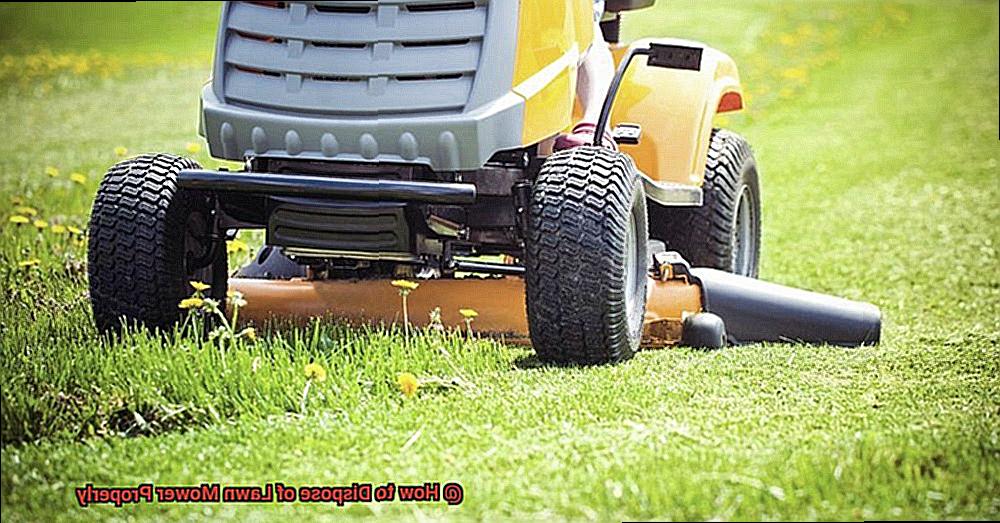
Donating a lawn mower can benefit both people in need and the environment by reducing waste in landfills. It’s a sustainable way to dispose of unwanted equipment while making a positive impact on society.
By choosing a reputable charity or non-profit organization, you can ensure that your donation goes towards making a meaningful difference in the community.
Disposing of Hazardous Waste from Lawn Mowers
Lawn mowers have many parts that can be harmful to the environment if not disposed of properly. These include batteries, oil filters, gasoline, and oil. To dispose of them correctly, it’s important to follow your local government or waste management facility’s guidelines.
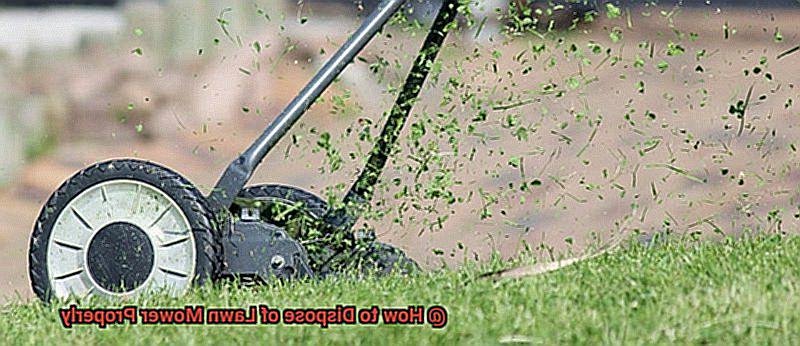
One crucial step is to locate a hazardous waste collection site in your community. These sites are specifically designed for handling hazardous waste and ensuring safe disposal without harming the environment.
When disposing of batteries, it’s essential to make sure they’re fully discharged before disposal. You can do this by using the battery until it no longer holds a charge or using a battery tester.
Oil filters should be drained of any excess oil before disposal. It’s also crucial to ensure they’re not crushed or punctured during disposal to prevent any oil leakage that could harm the environment.
Gasoline is another hazardous material that needs careful disposal. Never pour gasoline down the drain or dispose of it in the trash. Take it to a hazardous waste collection site for proper disposal.
Lastly, when disposing of oil, place it in a sealed container and take it to a recycling center or hazardous waste collection site for proper disposal. This ensures that the oil won’t harm the environment or wildlife.
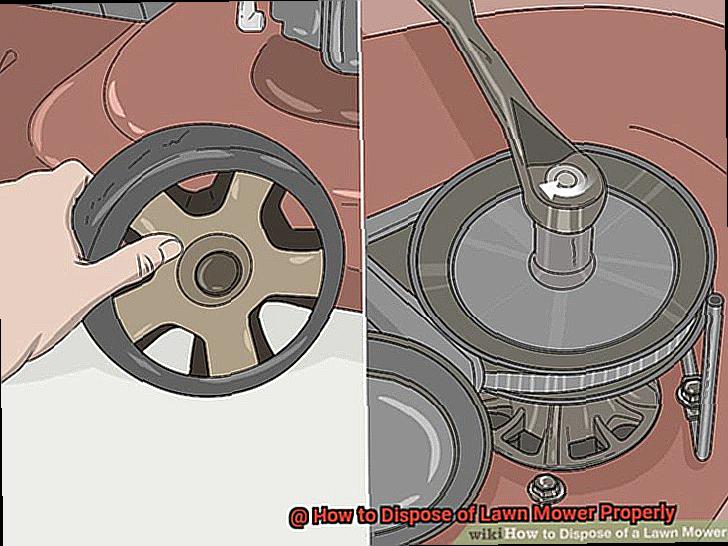
By following these guidelines for disposing of hazardous waste from lawn mowers, you can help protect the environment and ensure safe disposal of these materials.
Always check with your local authorities for specific guidelines and regulations on disposing of hazardous waste.
How to Find Your Local Recycling Center
Do you have an old lawn mower that is taking up space in your garage or backyard? Instead of throwing it away and harming the environment, consider recycling it. However, not all recycling centers accept lawn mowers, so how do you find the one that does? Here are five simple steps to help you find your local recycling center and dispose of your old lawn mower in an eco-friendly and safe manner.
Step 1: Check Online Resources
The first step is to check out online resources like Earth911.com or RecycleNation.com. These websites allow you to enter your zip code and search for recycling centers in your area. They also provide information on what types of items each center accepts, so you can be sure that your old lawn mower will be accepted.
Step 2: Contact Your Local Government
Another option is to check with your city or county government. Many municipalities have their own recycling programs and can provide information on where to take your lawn mower. They may also have specific guidelines on how to dispose of large items like lawn mowers, so be sure to ask for their advice.
Step 3: Contact the Manufacturer
You can also contact the manufacturer of your lawn mower. Some companies have take-back programs or partnerships with recycling centers, which can make the process easier for you. Additionally, they may have information on how to properly dispose of your lawn mower or even offer discounts on new equipment.
Step 4: Drain Gasoline and Oil
Before taking your lawn mower to a recycling center, be sure to drain any gasoline and oil from the machine. These substances can be hazardous and need to be disposed of properly. You can contact your local government or waste management department for guidance on how to properly dispose of these materials.
Step 5: Confirm Specific Requirements
Finally, before bringing in your lawn mower, confirm with the recycling center if there are any specific requirements for dropping it off.
Some centers may ask that you remove the gas and oil before bringing in the mower, while others may require that you bring it in during specific hours or on certain days. By confirming these details ahead of time, you can ensure a smooth and hassle-free drop-off.
By following these five simple steps, you can find your local recycling center and dispose of your old lawn mower in an eco-friendly and safe manner. Remember, it’s important to prioritize safety and environmental responsibility when disposing of your old equipment.
What to Look for When Donating a Lawn Mower
Donating a lawn mower is not only a great way to dispose of it properly, but it also helps out those in need while giving back to your community. However, before you donate your old mower, there are some things you should consider to ensure that your donation is effective.
Check with the organization or charity you plan on donating to.
Before donating your lawn mower, it’s important to check with the organization or charity you plan on donating to. Not all organizations accept lawn mowers, and some have specific requirements, such as only accepting certain types or models of lawn mowers or requiring that the mower be in good working condition. By doing this, you can ensure that your donation will be accepted and put to good use.
Consider the age and condition of the lawn mower.
Another important factor to consider when donating your lawn mower is its age and condition. If it is an older model or in poor condition, it may not be worth the cost for the organization to repair or refurbish it. In this case, it may be better to dispose of it through other means. By ensuring that your lawn mower is in good condition, you can increase the chances of it being accepted and put to good use.
Remove hazardous materials from the lawn mower.
Before donating your lawn mower, make sure to remove any hazardous materials such as gasoline and oil. These materials can be harmful to both people and the environment if not disposed of properly. By removing them from your lawn mower, you can help prevent potential accidents and ensure that it can be safely used by its new owner.
Include necessary paperwork and documentation.
Make sure to include any necessary paperwork or documentation with your donation, such as manuals or receipts for recent repairs or maintenance. This can help ensure that the recipient has all the information they need to use and maintain their new lawn mower properly.
Obtain a receipt or documentation for tax purposes.
Lastly, consider whether or not you want a tax deduction for your donation. If so, make sure to obtain a receipt from the organization that includes all relevant information. This can help you save money on your taxes while also giving back to your community.
By keeping these factors in mind when donating your lawn mower, you can ensure that it will be put to good use and benefit both the recipient and the environment.
Tips for Safely Handling and Disposing of Hazardous Material
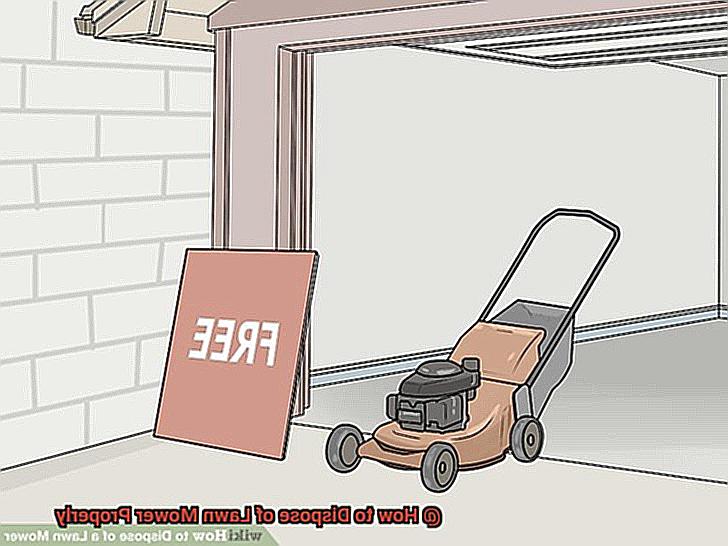
Saying goodbye to your old lawn mower can be a bittersweet moment. But before you bid it farewell, it’s important to remember that lawn mowers are considered hazardous material due to their gasoline and oil components. As such, handling and disposing of them safely is crucial for the safety of yourself, others, and the environment. Here are five tips for safely handling and disposing of your lawn mower:
Drain the Gas and Oil
The first step to disposing of a lawn mower is to drain the gas and oil from it. This can be done by running the mower until it runs out of gas or by using a siphon to remove any remaining gas. The oil can be drained by removing the oil cap and tilting the mower to pour out the oil into a container for recycling. This step is crucial because gasoline is highly flammable and can cause environmental damage if not disposed of properly.
Remove Blades Safely
Once you have drained the gas and oil, it’s time to remove the blades safely. Wear protective gloves and use a wrench to loosen and remove the blade. Wrap it in a cloth or newspaper and place it in a sturdy box for transportation. This step is important because the blades can cause injury if not handled properly.
Secure Loose Parts
When transporting your lawn mower, make sure to secure any loose parts and place it in a vehicle with proper ventilation. Loose parts can fall off during transportation, causing potential hazards on the road. It’s also important to check with your local waste management facility for specific guidelines on how to dispose of a lawn mower in your area.
Wear Protective Gear
It’s essential to wear protective gear such as gloves and eye protection when handling hazardous materials like gasoline and oil. This will prevent any contact with the material and reduce the risk of injury. Safety should always be a top priority when handling hazardous material.
Follow Local Regulations
It’s crucial to follow local regulations when disposing of hazardous waste such as lawn mowers. Many cities and towns have specific rules for how to dispose of hazardous waste, so be sure to check with your local municipality for guidance. Not following these regulations can result in fines or environmental damage.
By following these tips, you can dispose of your lawn mower in a responsible manner while also preventing any potential hazards. Remember to prioritize safety and environmental responsibility when handling and disposing of hazardous material.
How to Properly Package and Label Hazardous Materials
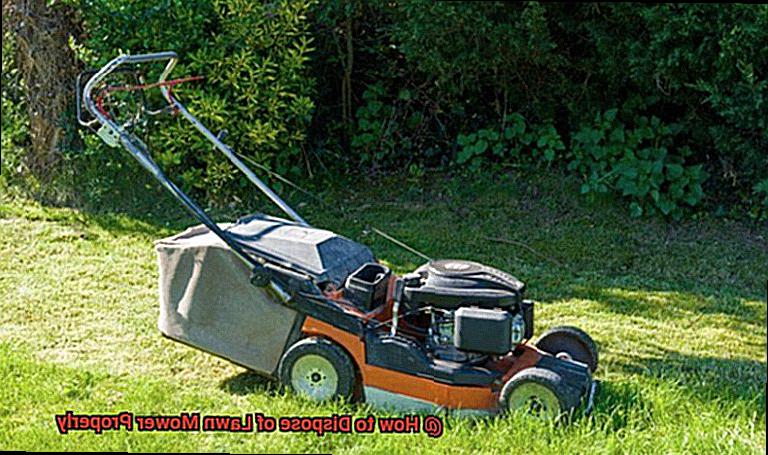
Saying goodbye to your trusty lawnmower is never easy, but it’s important to ensure that you dispose of it safely and responsibly. One crucial step in this process is properly packaging and labeling any hazardous materials that may be present. Here are five key tips on how to do so:
Drain the fluids
Before disposing of your lawnmower, it’s important to drain all fluids from the machine, including gasoline and oil. These liquids should be stored in appropriate containers and clearly labeled as hazardous materials. This not only protects the environment but also ensures that these materials are disposed of safely.
Do your research
Different recycling centers or waste management facilities may have specific guidelines for how hazardous materials should be packaged and labeled. Do your research beforehand to ensure that you’re following proper procedures.
Transport safely
Hazardous materials should never be thrown in the trash or dumped down the drain. To transport your lawnmower safely, use a specialized vehicle or hire a professional hazardous waste disposal company.
Secure packaging
To prevent injury during transportation, wrap your lawnmower in plastic or place it in a sturdy cardboard box. For added safety, remove any sharp or protruding parts.
Clear labeling
Make sure that your package is clearly labeled as containing hazardous materials with a “Hazardous Materials” sticker or by writing the words on the packaging itself. This helps ensure that your package is handled properly at each stage of disposal.
By following these steps, you can rest assured that your lawnmower is being disposed of safely and responsibly without causing harm to people or the environment. Properly packaging and labeling hazardous materials not only protects us all but can also save you from potential legal or financial repercussions for improper disposal.
What to Do if You Cannot Find a Suitable Recycling or Donation Option
When it’s time to upgrade to a new lawn mower, don’t just throw your old one in the trash. Improperly disposing of a lawn mower can harm the environment and public health. Luckily, even if recycling or donating it isn’t an option, there are still steps you can take to dispose of your old lawn mower properly. Here are five subtopics that explain what to do if you cannot find a suitable recycling or donation option for disposing of a lawn mower.
First Stop: Check with Your Local Waste Management Facility
Your first step should be to check with your local waste management facility. Some facilities may have special programs for household hazardous waste collection that accept lawn mowers. If this is the case, make sure to follow their guidelines for preparing the lawn mower for disposal. It’s important to prioritize safety and environmental responsibility when disposing of a lawn mower, so taking advantage of these programs is always the best option.
Reach Out to Lawn Equipment Dealers or Repair Shops
Another option is to contact a lawn equipment dealer or repair shop in your area. They may be willing to take your old lawn mower off your hands and either sell it for parts or recycle it themselves. This can be a great option because they likely have knowledge and experience in dealing with used lawn mowers and can ensure that they are disposed of properly.
Sell It for Scrap Metal
If neither of these options work for you, consider selling your lawn mower for scrap metal. While this may not be the most environmentally-friendly option, it’s still better than simply throwing the mower in the trash. You can search online for local scrap metal dealers who may be interested in purchasing your old lawn mower. Some dealers may even offer free pickup services.
Disassemble the Lawn Mower Yourself
If you have some technical knowledge and don’t mind getting your hands dirty, you can disassemble the lawn mower yourself and dispose of the different components separately. This ensures that each part is disposed of properly and can be recycled or disposed of as hazardous waste as needed. Remember to prioritize safety by draining all fluids and removing the spark plug before handling the lawn mower.
Hire a Professional Disposal Service
If all else fails, you can always hire a professional disposal service. These services specialize in disposing of difficult or hazardous materials and can ensure that your lawn mower is disposed of safely and responsibly. While this may be the most expensive option, it can provide peace of mind knowing that your old lawn mower is being handled by professionals.
In conclusion, disposing of a lawn mower properly is crucial for protecting the environment and public health. There are several options available when recycling or donating your lawn mower isn’t feasible. By taking the time to research and follow proper disposal procedures, you can ensure that your old lawn mower is disposed of responsibly.
eeEVigsVqrE” >
Conclusion
In conclusion, disposing of a lawn mower properly is crucial for the environment and your safety.
Instead of throwing it in the trash, consider recycling or donating it to a local organization. Always make sure to drain all fluids and remove any hazardous materials before disposal.
By taking these steps, you can help reduce waste and protect our planet while also ensuring that your old lawn mower doesn’t end up causing harm.
